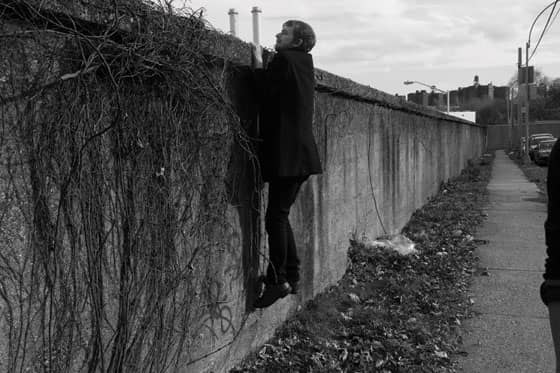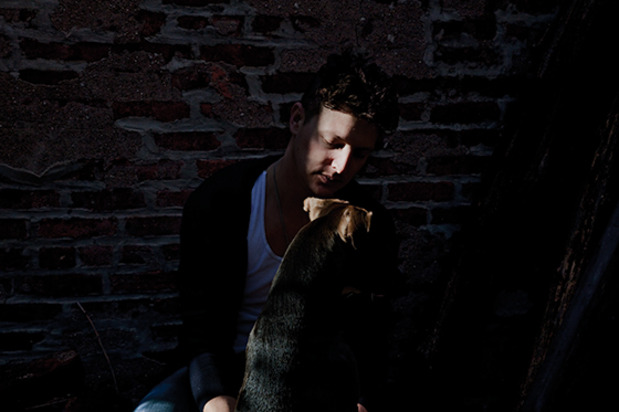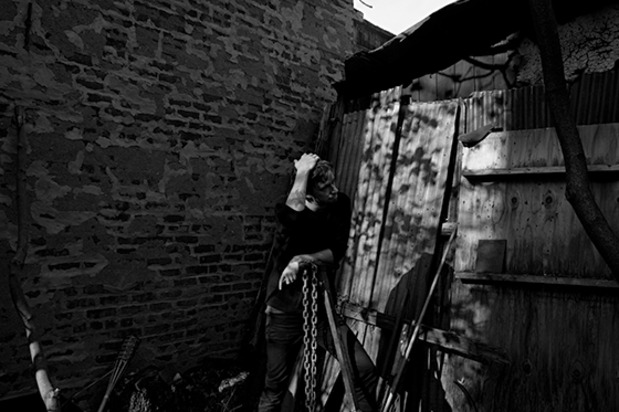Waiting in line for Korean food, Yeasayer’s Anand Wilder is wearing glasses slightly too big for his head and a backpack cinched up between his shoulder blades. I’m on time, thinking he’ll be late. He was early, knowing I’d be on time. So far, it feels more like I’m here to meet a med student than a rock star, but that’s because Wilder’s treating our interview like it’s part of his job—typically normal behavior from a band that you expect to be a whole lot weirder than they actually are. In fact, Yeasayer are three normal guys with an instinct for masking complex histories and very real worries about the end of the world behind pop hooks so strong they could easily pull one over on any listener not paying close enough attention.
Brooklyn’s music scene has changed a lot since the release of Yeasayer’s debut, All Hour Cymbals, in 2007. Back then it was plausible, but still kind of weird, that Animal Collective could be one of the biggest bands in the world. Gang Gang Dance had yet to hire a Vibes Manager. Hisham Bharoocha had only organized one Boadrum. The artists who built and sustained New York for half a decade were now moving beyond it, and to the young people living in the city then, who had missed the vital years of this, it felt like nothing new was happening. There was a definite in-between feeling in the air—an indistinct passing of the torch moment when the established avant-garde didn’t so much pass the torch as drop it on the ground for someone to pick up. People tried. Specifically, the next generation of Brooklyn bands—MGMT, Chairlift, Amazing Baby—were creating a scene of poppier, kind of radio-friendly neo-hippie music that came along with bizarre facepaint and white guys dressed in full Native American gear, headdresses included. People namedropped Graceland a lot, and it wasn’t that unusual to find yourself in a conversation about random African records as if you’d been listening to them your whole life. Out of nowhere, Chairlift got a song in an Apple commercial and signed to a major. MGMT skipped starter band status completely and became huge off a couple great singles and a solid debut. These sudden ascents left a pocket for Yeasayer, who were loosely associated with this crew, but, to keen observers, were definitely outside of it. They had a great live show—Chris Keating flailed spastically, yelping wildly while he pounded at a drum machine or sampler; Wilder’s guitar broke crystal clear through gelatinous synth buzz; and Ira Wolf Tuton’s bass stuck in the back without ego, dazzling with subtle theatrics if you cared to listen. If not, no big deal, they’d probably all be switching instruments at some point, maybe even dropping them altogether for wide-eyed harmonizing. It didn’t ultimately matter, it sounded awesome.
As Yeasayer played more shows, more people heard the harmonies and exotic guitar licks, saw Wilder and Wolf Tuton’s shoulder length hair and weird outfits (neon camouflage) and the way Keating went nuts on stage, and didn’t know what to make of them, other than that were definitely doing their own shit. They started getting more press but declined individual interviews, instead responding to questions via email, including a manifesto from Keating in this magazine that somehow both perfectly described the band and provided plenty of fodder for detractors: “We are tired of feeling like a lost generation who need to romanticize the past. We want to make interesting and diverse music that doesn’t sound like much else.” It’s a valid statement, but it is also so assured that it sounded pretentious. The reality was that Keating, Wilder and Wolf Tuton were just huge music nerds with big vision who saw the coming end of an era and were willing to forge ahead all alone, if necessary.
To understand how and why they never really felt the need to fit in, it helps to go back to elementary school. Keating and Wilder met in Baltimore in first grade when Keating kicked Wilder in the balls for no reason. “I don’t know why, but I think about that a lot,” Keating says. “I think your concept of what hurts in first grade is different. I had a lot of anger issues, it turned into a big deal and he hated me. Then in fourth grade we became friends because we were both sort of obnoxious or whatever.” Meanwhile, Wolf Tuton was growing up in a musical house in Philadelphia, his dad a jazz bass player and much of his mother’s side of the family classical musicians. As a result, when Wolf Tuton picked up the bass, he played to impress—ignoring song structure and hooks in favor of technical fingerwork and low-end theatrics. Eventually he’d realize he “didn’t have to be Jaco Pastorius. I just had to have my own voice.” Wolf Tuton would meet Wilder and Keating through a complex familial web that involved Wilder’s cousin getting married to Wolf Tuton’s sister. They started bro-ing down over shared and unshared music obsessions, so that by the time Wolf Tuton joined Keating and Wilder in New York, starting a band seemed an obvious choice. “I don’t pay attention to any of the history without me,” Wolf Tuton laughs. “It’s not very important or interesting. Somebody was doing something, then I showed up. That’s when we really got going.”
Yeasayer’s new album, Odd Blood, is the fully realized result of this random violence turned friendship and strangely destined new path, inexplicably blending heartache and the looming global apocalypse. Where Cymbals dulled the impact of their doomsaying by sheathing it in gauzy jams, Odd Blood punctuates it with sharp hooks and clear vision. It’s almost deceptively simple on the surface, but underneath runs a churning and meticulously strange thought process. There is an ominous intensity even in the most outwardly exuberant songs—a thread that Wilder confirms runs through the new album. “We found our juxtaposition,” he says. “We like to have things that are at war with one another. When we did ‘O.N.E.’ I was sort of against it at first. But then it was like, Let’s make a dance beat that’s undeniable.”
“O.N.E.” sounds like it’s from an ’80s beach party montage, with hyperactive drums and calypso synth, but the lyrics are the confession of an abandoned infatuation. “Mondegreen” works in reverse, employing a heavily processed horn section, urgent handclaps and martial tempo, clashing with the carefree chorus Everybody’s talkin’ about me and my baby, making love to the morning, morning light. Knowing Yeasayer’s decidedly bleak perspective, these juxtapositions become disconcerting, the last desperate pleas before the end of the world. “You can’t help but look around the world and think that something is really wrong,” says Keating. “You go to Bombay or Rio and there’s a pile of trash and smog and that’s an example of what America is going to become: absent middle class, huge lower class, elite fucking ivory tower bullshit with the ruling class. The future is a little bleak. I read the newspaper, and I’m interested in what’s going on in the world, but I don’t consider us super political. I don’t know where to start with that.”
There seems to be some uncertainty about how their existing fanbase will take Odd Blood, a record that is tighter, more dense and considerably less mystical than Cymbals. “I feel like we’ll probably alienate some people,” Keating says. “I wonder if people are going to be bummed, like our hardcore hippie fanbase. [The British press was] so into their shitty version of fashion that they’re like, Are you guys hippies? And it’s like, What are you talking about? What do you mean? Do I have a dreamcatcher hanging off my shit? I don’t know! I didn’t shave. I’ve been on tour. We’ll totally embrace some kind of post-version of whatever the hippie lifestyle means, but we’re city guys.” Odd Blood’s first single, “Ambling Alp,” might be the best example of this conflicted and hermetic philosophy. At first it seems emptily inspiring, Keating singing about sticking up for yourself in the face of anything that comes your way, and then there’s an unusual reference to Nazi boxing champ, Max Schmelling. “My grandfather was a boxer,” Keating explains. “I grew up with a lot of that stuff, boxers were emphasized. It’s almost like someone’s giving [a young] Joe Lewis advice—this is how you fucking be tough and stay positive. It was a good challenge for me to try and include these archetypes and historical figures that I like to read about. I’ve never really been able to do that.” Then Keating shows me a massive crab tattoo on his arm that people often misconstrue as an astrological sign but is actually a dedication to his Baltimore roots. It seems no matter what Keating, Wilder and Wolf Tuton do or say they will be misunderstood because no one can pinpoint exactly what Yeasayer is about. They will always be on the outside, looking even further out.
When I meet all three to discuss the new album, it doesn’t feel like much has changed since we met in 2007, other than a couple new haircuts. They riff off each other, moving from inside joke to inside joke—only Wolf Tuton answers my questions with any seriousness. Keating lapses into wild fake accents and elliptical trains of thought punctuated by unpredictable hand gestures that are not dissimilar to his stage spasms. But in reality, everything is different now. Since Cymbals, and after its extensive global touring, Yeasayer disappeared to work on solo stuff, linked up for some interesting collaborations (Wilder produced an EP for Suckers and wrote a musical; Keating and Wolf Tuton guested on Bat for Lashes’ Two Suns) and spent time upstate in a home studio owned by a dude who used to play with Phil Collins. While they were gone, a million little Brooklyn bands abandoned pristine sheen and buried their pop hooks under layers of lo-fi grime and fuzz; shows shifted to abandoned hotels and dicey yards under subway tracks where it seemed like everyone was playing their first shows ever.
Not only is Yeasayer’s music the complete opposite of the prevailing style, its members lead more subdued lifestyles. No one goes out like they used to. Keating is married. Wolf Tuton lives with his girlfriend and has a garden. Wilder seems content to hang out until his girlfriend gets off work so they can spend as much time together as possible before the band hits the road again. They’re not rich, but they’re certainly not struggling either, and all three live in relatively sedate neighborhoods. They treat Yeasayer as both an incredibly important personal project and a very serious job. They’re always on time, and they know their own schedules without having to ask a publicist or manager. Where many bands can barely get it together enough to practice, Yeasayer will spend all day every day refining its live show.
When I meet Wolf Tuton at his new house, it’s in Vinegar Hill—a neighborhood located in a historic pocket between the abandoned Navy Yards and upscaled DUMBO near the Brooklyn Bridge. It’s a fitting place, sparsely populated and filled with odd character, but hardly a mecca for youth. “None of us are 18-year-olds trying to get a fast check,” says Wolf Tuton. “I know what it is to be a frustrated artist and I know when I see something that’s working. We’re so fortunate to have what we have and it’s up to everyone else to figure out whether they want us to have a career or not. So far so good. The goal now is to get the live show bigger and bigger. Reinvest in that. I want to make that more entertaining.” Then he pauses and looks around the room that will soon become his personal studio. “I’d also like to get a bookshelf.”
This really is the key to understanding Yeasayer, the band so normal it’s circled right back around to weird. They write songs about personal relationships and keeping hope alive, even when it’s clear they could talk forever about the dark future of our planet. They have misinterpreted tattoos and prefer the Grand Central Oyster Bar or top of the Empire State Building to Williamsburg. Yeasayer’s New York is skyscrapers, roofs with scattered water towers, fading signs on crumbling brick—things that stood the test of time and withstood the city’s harshness. They don’t ever seem to quite fit in, but don’t care, because in the end—which will probably come in the form of a massive tidal wave over Manhattan—what does that matter?
In a scene straight out of one of his songs, Keating and I are walking in one of the most unbearable rainstorms of the winter. We’re talking casually, pretending that the sidewalk isn’t about to wash away, before eventually conceding and heading to a coffee shop near his house. A kid sits at a table next to us, blatantly listening to our conversation, curiosity probably piqued by the recorder sitting in the middle of the table. As we get up to leave, fumbling with soggy coats and damp coffee cups, the kid edges over, visibly nervous and gesticulating in tiny caffeinated jitters. He tells Keating he’s a huge fan of Yeasayer, and they exchange a couple minutes of small talk. It’s a nice rarity in a city where people often worry that being enthusiastic will make them uncool. Keating, obviously appreciative, thanks the kid, opens the door and steps back into the torrential downpour.





